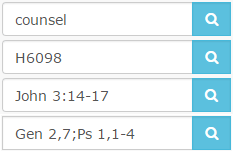This intelligent search box has three functions:
- simple search words or parts of words
- Strong's Numbers searching (of course, only for translations and texts, that contain Strong's numbers)
- direct link on a specific book, chapter and verse (or range of verses)
- list of verses (you can display more of selected verses from different parts of the Bible)

1) Simple search
The basic functionality is simple search parts of words, whole words and phrases. Searching multiple words is simply usable in translation without notes of translators, superscripts, italicized parts, Strong's numbers, morphology and the like. The point is, that in this case is between the words often HTML, JS or PHP code (not visible at first sight). In these cases it is suitable to use advanced search features - eg. search for any words or their parts. In the case simple searching you can write or paste search term into the search box and then click on the magnifying glass symbol. You can also use the wildcards "_" or "%". Wildcard "%" (percents) allows you to match any string of any length (including zero length), wildcart "_" (lower underscore) allows you to match on a single character. All listings of occurrences are also active links to verses (abbreviation of books comply with the selected language of SOB interface). By clicking on the book abbreviation limit your search to a specific book.
2) Strong's Numbers searching
So called Strong's numbers are a popular tool of persons interested for a deeper study and understanding of Scripture, and do not know biblical languages. In the search box, you can also enter the mentioned Strong numbers - G1~G5624 for Greek written part of the Bible (New Testament and the Septuagint) and H1~H8674 for the Hebrew part (Old Testament). The program first assess, whether is the search term Strong's number, a direct link or a standard search term, and accordingly will act. In the case it is a Strong's number, judge, if the selected text contains Strong's numbers. If not, you will be notified about it. Strong's Numbers searching works even in the event that are currently Strong numbers hidden). (On devices without a touchscreen You can directly click on Strong's number - for displaying concordances and dictionaries in a new tab). You can mark (select) the Strong's number in the text. After selecting the Strong's number will appears possibility find Strong's number or switch to a concordance, where in addition to all occurrences you can find also meanings the corresponding word in many languages.

3) Direct links
Direct links are the quickest way to move to a specific place of the Bible, they are also very useful, eg. if using links on the SOB on the discussion forums, blogs and personal websites (just copy the address).
Direct link to enter the name of the book (or an abbreviation), separator (space, comma, semicolon, colon, dash), chapter number, separator, verse number (optional), separator (optional), final verse (optional) - eg: John 3 16 (John 3:16) or eg John 3,12-16 (John 3:12-16).
Abbreviations name of the books: Gen, Exod, Lev, Num, Deut, Josh, Judg, Ruth, 1Sam, 2Sam, 1Kgs, 2Kgs, 1Chr, 2Chr, Ezra, Neh, Esth, Job, Ps, Pro, Eccl, Song, Isa, Jer, Lam, Ezek, Dan, Hos, Joel, Amos, Obad, Jonah, Mic, Nah, Hab, Zeph, Hag, Zech, Mal, Matt, Mark, Luke, John, Acts, Rom, 1Cor, 2Cor, Gal, Eph, Phil, Col, 1Thess, 2Thess, 1Tim, 2Tim, Titus, Phlm, Heb, Jas, 1Pet, 2Pet, 1John, 2John, 3John, Jude, Rev
You can also use lower case letters as well as Czech, Slovak and Russian common abbreviations, names or even whole books.
4) List of verses
Newly (4/2017) you can also insert list of verses - direct links separated by semicolon (with no space!). This option is (as well as direct links) especially useful for the discussion forums, blogs and personal websites (just copy the address).
Example: "John 3:16;Gen 2 4-7;Ps 1,1-4;Pro 2,6"